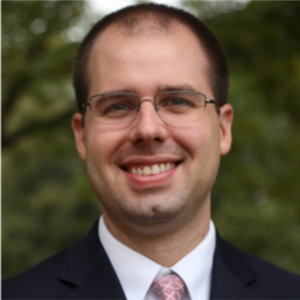Director of Global Engagement, Partners, Work to Keep Learner Assessments Globally Relevant, Consistent
January 29, 2021Eshelman School of Pharmacy

David Steeb, Pharm.D., MPH.
As health education and training around the world shifts toward competency-based approaches, academic institutions and organizations are now working to define appropriate preparation and assessment strategies for use across the continuum of public health care, according to David Steeb, Pharm.D., MPH.
Knowing this, Steeb, the UNC Eshelman School of Pharmacy’s director of global engagement, led a team of researchers from a variety of health fields, to develop entrustable professional activities (EPAs) for global health that can be applied across academic and workplace settings. EPAs are key tasks individuals can be trusted to perform within their fields following instruction.
The team’s EPA statements were recently published online ahead of print in Academic Medicine, the No.1-ranked journal in health professions education.
“Global health education and professional training programs are increasingly changing around the world,” Steeb said. “In the United States alone, more than a quarter of medical and dental students, and a growing number of nursing and pharmacy students, participate in a global health experience. As educators, we must acknowledge this growing trend and begin to incorporate a set of common global health competencies and assessment approaches into our curricula.”
Steeb said EPAs were pioneered by medicine in 2005, and have evolved in various disciplines, including pharmacy in 2017. This team began their work in 2019, by gathering 30 global health experts from medicine, nursing, pharmacy, and public health to participate in a multi-step process to develop an agreed upon set of EPAs for global health work.
Contributing experts averaged 17 years of global health experience, and 40% were based in low-to-middle-income countries.
Together, they developed 22 EPA statements that fell into five health profession job role categories: partnership developer, capacity builder, data analyzer, equity advocate, and health promoter.
Examples of developed statements include: work collaboratively as a team member to achieve shared goals; conduct health needs assessments; and advocate for equitable access to health care.
Statements in the equity advocate and partnership developer categories received the highest agreement for importance and relevance. Tina Brock, MSPharm, EdD, a collaborator on the study from Monash University, suggests that the fragile architecture that often supports exchange in global health can be strengthened by establishing this shared definition of trusted performance. “Now that we have developed these EPAs, we look forward to collaborating with host sites to test how they perform in practice,” Brock said.
“I am thrilled that we were able to come together to develop a common set of EPAs for global health that health workers and learners can apply in the field around the world. We welcome collaboration with others as we implement these statements and further advance global health education and training,” Steeb added.
In addition to Steeb, authors include the School’s former global engagement fellow, Sarah Dascanio, PharmD, MPH; Monash PharmAlliance collaborator Tina P. Brock, EdD, MS; Paul K. Drain, MD, MPH; Allison Squires, PhD; Melissa Thumm, MSc; Robin Tittle, MD, MS; and Stuart T. Haines, PharmD.
An advanced copy of the publication is available online now, and the print edition will be available in the spring.
